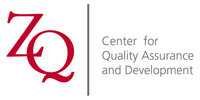Funding Institutions
European Union
Federal Ministry of Education and Research
German Academic Exchange Service (DAAD)
Duration
First funding period: 2019 - 2022
Second funding period: 2023 - 2026
Background and objectives
In the context of the "European Universities Initiative", the European Commission has selected the FORTHEM-Alliance[1] as one of 17 European university networks to test innovative approaches and new ideas for the further development of the European education sector.
The objectives are to increase the exchange, cooperation and mobility of students, teachers, researchers, and academic staff within the EU, to integrate the various mobility agreements, research programs, double and multiple degrees of the partner universities in a common "Transnational Higher Education Strategy" and to make the European model of an open society and the exchange of knowledge come alive for actors inside and outside the universities in a creative and vibrant way.
The Center for Quality Assurance and Development was entrusted with the evaluation of the Alliance during the first funding phase and will continue assuming this role during the second funding phase.
The evaluation examines to what extent the implementation of the Alliance’s activities
- promotes the Alliances governance and its compatibility with national and institution-specific conditions, structures, and processes,
- facilitates the development and expansion of multidisciplinary expert networks through the FORTHEM-Labs to intensify the collaboration of university staff, students, and external parties as well as the development and dissemination of research-based results,
- strengthens the impact on society through the implementation of co-design approaches based on dialogue and collaboration with surrounding schools, businesses, public institutions, and social actors.
Furthermore, the evaluation focuses on the challenges of implementing a comprehensive strategy, planned measures as well as key success factors.
Research design/ methodological approach
The evaluation follows a triangulated approach and therefore combines results from qualitative and quantitative empirical approaches, which are obtained on the one hand from digital questionnaire surveys and on the other hand from qualitative guided interviews with students, university staff and external actors.
Implementation
In the spirit of a formative evaluation, the insights gathered from the analyses of the surveys are intended to identify aspects in need of improvement and thus support the further development of the FORTHEM-Alliance.
[1]Cooperation between the Université de Bourgogne in France, the Uniwersytet Opolski in Poland, the Universitat de València in Spain, the Università degli Studi di Palermo in Italy, the Latvijas Universitāte in Latvia, the Jyväskylän yliopisto in Finland, the Universitetet i Agder in Norway, the Universitatea Lucian Blaga din Sibiu in Romania and the Johannes Gutenberg University Mainz in Germany.
